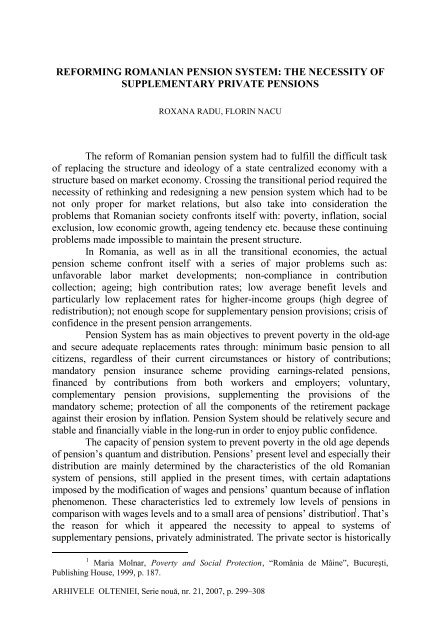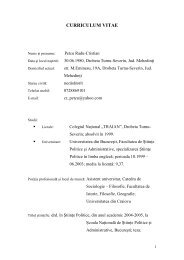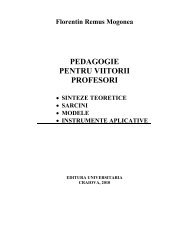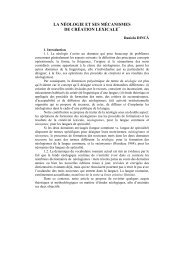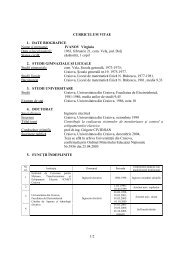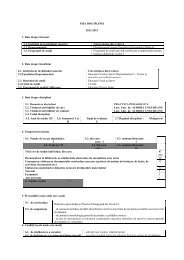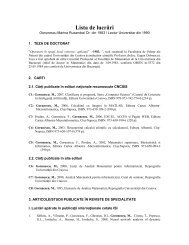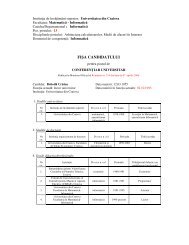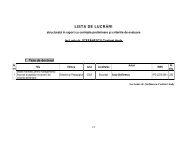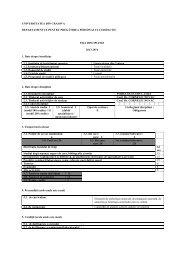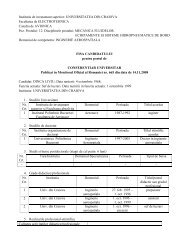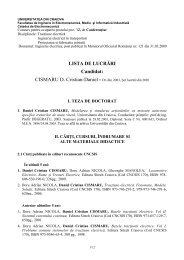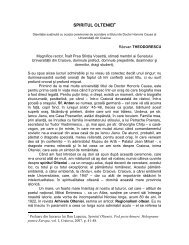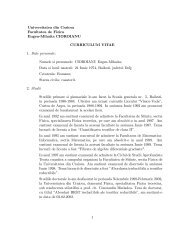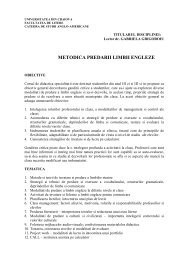- Page 1 and 2:
ACADEMIA ROMÂNĂ / ROMANIAN ACADEM
- Page 3 and 4:
CONTENTSARCHEOLOGY-HISTORYSIMONA LA
- Page 5 and 6:
PHILOSOPHY-SOCIOLOGYCONSTANTIN MIHA
- Page 7 and 8:
ARCHEOLOGY-HISTORYTYPES OF HABITAT
- Page 9 and 10:
Types of habitat at the end of the
- Page 11 and 12:
Types of habitat at the end of the
- Page 13 and 14:
Types of habitat at the end of the
- Page 15 and 16:
Types of habitat at the end of the
- Page 17 and 18:
Types of habitat at the end of the
- Page 19 and 20:
Types of habitat at the end of the
- Page 21:
Types of habitat at the end of the
- Page 24 and 25:
24Marin Tomawhat they understood by
- Page 26 and 27:
26Marin TomaIn the sound made by cl
- Page 28 and 29:
28Marin TomaAcross time, history sh
- Page 31 and 32:
HISTORY, LITERATURE AND ARTIN THE S
- Page 33 and 34:
History, literature and art in the
- Page 35 and 36:
History, literature and art in the
- Page 37 and 38:
History, literature and art in the
- Page 39 and 40:
THE ESTATES OF THE GLOGOVEANU BOYAR
- Page 41 and 42:
The estates of the Glogoveanu boyar
- Page 43 and 44:
The estates of the Glogoveanu boyar
- Page 45 and 46:
THE URBANISTIC EVOLUTION OF THE CIT
- Page 47 and 48:
The urbanistic evolution of the cit
- Page 49 and 50:
The urbanistic evolution of the cit
- Page 51 and 52:
The urbanistic evolution of the cit
- Page 53 and 54:
ÊTRE PRÉFET EN ROUMANIE, 1866-191
- Page 55 and 56:
Être préfet en Roumanie, 1866-191
- Page 57 and 58:
Être préfet en Roumanie, 1866-191
- Page 59 and 60:
Être préfet en Roumanie, 1866-191
- Page 61 and 62:
Être préfet en Roumanie, 1866-191
- Page 63 and 64:
Être préfet en Roumanie, 1866-191
- Page 65 and 66:
Être préfet en Roumanie, 1866-191
- Page 67 and 68:
Être préfet en Roumanie, 1866-191
- Page 69:
Être préfet en Roumanie, 1866-191
- Page 72 and 73:
72Marusia Cârsteala nécessité po
- Page 74 and 75:
74Marusia CârsteaC’est ce qui a
- Page 76 and 77:
76Marusia Cârsteaprojets visant la
- Page 79 and 80:
AN ATTEMPT OF MODERNIZATION IN CRAI
- Page 81 and 82:
An attempt of modernization in Crai
- Page 83 and 84:
An attempt of modernization in Crai
- Page 85 and 86:
An attempt of modernization in Crai
- Page 87 and 88:
THE ROMANIAN NATIONAL BANKAFTER NAT
- Page 89 and 90:
The Romanian National Bank after na
- Page 91 and 92:
The Romanian National Bank after na
- Page 93 and 94:
THE ROMANIAN LEGISLATION BETWEEN 19
- Page 95 and 96:
The Romanian legislation between 19
- Page 97 and 98:
The Romanian legislation between 19
- Page 99 and 100:
The Romanian legislation between 19
- Page 101 and 102:
The Romanian legislation between 19
- Page 103:
The Romanian legislation between 19
- Page 106 and 107:
106Narcisa Mituagricultural transfo
- Page 108 and 109:
108Narcisa Mituconsolidation of col
- Page 110 and 111:
110Narcisa Mitumachine and tractors
- Page 112 and 113:
112Gabriel Silviu Lohonminte/o fat
- Page 114 and 115:
114Gabriel Silviu Lohonputernică d
- Page 116 and 117:
116Gabriel Silviu Lohon
- Page 118 and 119:
118Mădălina Abagiuthan it is usua
- Page 120 and 121:
120Mădălina Abagiuthe monkey stag
- Page 122 and 123:
122Mădălina Abagiuécrivains, Cea
- Page 124 and 125:
124Nicolae VîlvoiThe “Vetre stra
- Page 126 and 127:
126Nicolae Vîlvoihave been kept, m
- Page 128 and 129:
128Nicolae Vîlvoiowners, due to la
- Page 130 and 131:
130Cosmin VilăuLe premier livre im
- Page 132 and 133:
132Cosmin VilăuL’édition de Râ
- Page 134 and 135:
134Cosmin Vilăurang, d’autant pl
- Page 136 and 137:
136Cosmin Vilău
- Page 138 and 139:
138Tudor NedelceaRomanian army, mea
- Page 140 and 141:
140Tudor NedelceaBalkans, while ver
- Page 142 and 143:
142Tudor Nedelceadisappeared” 23
- Page 144 and 145:
144Tudor Nedelceavisibly fading bef
- Page 146 and 147:
146Tudor Nedelcea
- Page 148 and 149:
148Iustina Burciother lexical micro
- Page 150 and 151:
150Iustina Burcidârvar - a servant
- Page 152 and 153:
152Iustina Burcivistier - a high of
- Page 154 and 155:
154Iustina BurciMÉTIERS ET EMPLOIS
- Page 156 and 157:
156Elena-Camelia ZăbavăLes noms i
- Page 158 and 159:
158Elena-Camelia Zăbavă2. Les nom
- Page 160 and 161:
160Elena-Camelia Zăbavăformules d
- Page 162 and 163:
162Elena-Camelia Zăbavăautres; P
- Page 164 and 165:
164Elena-Camelia ZăbavăANTHROPONY
- Page 166 and 167:
166Carmen Popescufalling into the c
- Page 168 and 169:
168Carmen Popescu“arbitrary noise
- Page 170 and 171:
170Carmen Popescunot fulfill our wi
- Page 172 and 173:
172Carmen PopescuWe risk hardening
- Page 174 and 175:
174Carmen Popescuhave not love, I a
- Page 176 and 177:
176Carmen Popescu
- Page 178 and 179:
178Mihaela Albumanaged to change us
- Page 180 and 181:
180Mihaela Albuvalues and imposing
- Page 182 and 183:
182Mihaela AlbuIt was an important
- Page 184 and 185:
184Isabel FernándezThe Direct Meth
- Page 186 and 187:
186Isabel FernándezTaking into acc
- Page 188 and 189:
188Isabel FernándezProfesor Univer
- Page 190 and 191:
190Gabriela BoangiuLaplantine’s E
- Page 192 and 193:
192Gabriela Boangiuby going over th
- Page 194 and 195:
194Gabriela Boangiuthe other hand.
- Page 196 and 197:
196Gabriela Boangiuit becomes the o
- Page 198 and 199:
198Gabriela Boangiu
- Page 200 and 201:
200Anca Ceauşescuspecially, the mo
- Page 202 and 203:
202Anca CeauşescuThe people from t
- Page 204 and 205:
204Anca CeauşescuThe image nr. 1 B
- Page 206 and 207:
206Anca Ceauşescuproportions betwe
- Page 208 and 209:
208Constantin Mihaiprimordiale du p
- Page 210 and 211:
210Constantin MihaiMircea Vulcănes
- Page 212 and 213:
212Constantin Mihaise résout pas d
- Page 214 and 215:
214Constantin Mihaicréation qui so
- Page 216 and 217:
216Constantin MihaiIls affirment la
- Page 218 and 219:
218Constantin Mihai«l’image d’
- Page 220 and 221:
220Constantin Mihaisa fonction n’
- Page 222 and 223:
222Constantin Mihai
- Page 224 and 225:
224Ana Maria Cincăd’opposition a
- Page 226 and 227:
226Ana Maria Cincăplotinienne, qui
- Page 228 and 229:
228Ana Maria Cincăc’est-à-dire
- Page 230 and 231:
230Ana Maria Cincă3. L’Eros hér
- Page 232 and 233:
232Ana Maria CincăReportée au ter
- Page 234 and 235:
234Ionel BuşeVlad III: héros ou m
- Page 236 and 237:
236Ionel Buşerégions rurales roum
- Page 238 and 239:
238Ionel BuşeCes productions litt
- Page 240 and 241:
240Ionel Buşepolitique après l’
- Page 242 and 243:
242Ionel Buşe
- Page 244 and 245:
244Rodica ŢuguiThe synthesis from
- Page 246 and 247:
246Rodica Ţuguidisease. 9 Decreasi
- Page 248 and 249: 248Rodica Ţuguifrom the modern wor
- Page 250 and 251: 250Rodica ŢuguiB. Perceptions and
- Page 252 and 253: 252Rodica Ţuguidie, and this could
- Page 254 and 255: 254Rodica Ţuguistrong feeling that
- Page 256 and 257: 256Rodica Ţuguialways announce tha
- Page 258 and 259: 258Rodica Ţuguion the need to defi
- Page 260 and 261: 260Rodica ŢuguiThe “HIV/AIDS ”
- Page 262 and 263: 262Rodica Ţuguiare mortals”. Als
- Page 264 and 265: 264Ileana Romanelements considered
- Page 266 and 267: 266Ileana RomanNo matter the type o
- Page 268 and 269: 268Ileana RomanThe role of the pare
- Page 270 and 271: 270Ileana RomanAfter the divorce, w
- Page 272 and 273: 272Ileana Roman
- Page 274 and 275: 274Costache Gheorghe, Mihaela Popes
- Page 276 and 277: 276Costache Gheorghe, Mihaela Popes
- Page 278 and 279: 278Costache Gheorghe, Mihaela Popes
- Page 280 and 281: 280Elena Alexandra IlincaIt is also
- Page 282 and 283: 282Elena Alexandra IlincaThe most i
- Page 284 and 285: 284Elena Alexandra Ilinca
- Page 286 and 287: 286Robert Paul Puică, Denisa Lored
- Page 288 and 289: 288Robert Paul Puică, Denisa Lored
- Page 290 and 291: 290Robert Paul Puică, Denisa Lored
- Page 292 and 293: 292Robert Paul Puică, Denisa Lored
- Page 294 and 295: 294Cristina Otovescu, Radu RizaDans
- Page 296 and 297: 296Cristina Otovescu, Radu RizaCett
- Page 300 and 301: 300Roxana Radu, Florin Nacuimportan
- Page 302 and 303: 302Roxana Radu, Florin NacuPublic p
- Page 304 and 305: 304Roxana Radu, Florin NacuIn post-
- Page 306 and 307: 306Roxana Radu, Florin Nacuadhesion
- Page 308 and 309: 308Roxana Radu, Florin NacuPension
- Page 310 and 311: 310Mihai Ghiţulescu, Cosmin Lucian
- Page 312 and 313: 312Mihai Ghiţulescu, Cosmin Lucian
- Page 314 and 315: 314Nicu VintilăErik Weil insiste s
- Page 316 and 317: 316Nicu VintilăC'est ainsi la soci
- Page 318 and 319: 318Cezar Avram, Diana Păunoiu, Lau
- Page 320 and 321: 320Cezar Avram, Diana Păunoiu, Lau
- Page 322 and 323: 322Cezar Avram, Diana Păunoiu, Lau
- Page 324 and 325: 324Cezar Avram, Diana Păunoiu, Lau
- Page 326 and 327: 326Cezar Avram, Diana Păunoiu, Lau
- Page 328 and 329: 328Cezar Avram, Diana Păunoiu, Lau
- Page 330 and 331: 330Cezar Avram, Diana Păunoiu, Lau
- Page 332 and 333: 332Cezar Avram, Diana Păunoiu, Lau
- Page 334 and 335: 334Roxana Nanu, Oana Berceanu, Radu
- Page 336 and 337: 336Roxana Nanu, Oana Berceanu, Radu
- Page 338 and 339: 338Roxana Nanu, Oana Berceanu, Radu
- Page 340 and 341: 340Roxana Nanu, Oana Berceanu, Radu
- Page 342 and 343: 342Gheorghe Bică, Mădălina Const
- Page 344 and 345: 344Gheorghe Bică, Mădălina Const
- Page 346 and 347: 346Gheorghe Bică, Mădălina Const
- Page 348 and 349:
348Gheorghe Bică, Mădălina Const
- Page 350 and 351:
350Gheorghe Pîrvu, Ramona Gruescu-
- Page 352 and 353:
352Gheorghe Pîrvu, Ramona GruescuL
- Page 354 and 355:
354Gheorghe Pîrvu, Ramona GruescuC
- Page 356 and 357:
356Gheorghe Pîrvu, Ramona GruescuT
- Page 358 and 359:
358Marin Băbeanumaintain the work
- Page 360 and 361:
360Marin BăbeanuWomen represent 45
- Page 362 and 363:
362Marin BăbeanuThe professional s
- Page 364 and 365:
364Marin Băbeanu• The proportion
- Page 366 and 367:
366Sandu Boengiua condition necessa
- Page 368 and 369:
368Sandu BoengiuWe can appreciate t
- Page 370 and 371:
370Sandu BoengiuIt has to be underl
- Page 372 and 373:
372Sandu BoengiuThe vegetal detritu
- Page 374 and 375:
374Note, comentarii, recenziirenom.
- Page 376 and 377:
376Note, comentarii, recenziiidées
- Page 378 and 379:
378Note, comentarii, recenzii
- Page 380 and 381:
380High Studies in Roman Law, from
- Page 382 and 383:
382
- Page 384 and 385:
384• Tudor Nedelcea, Centenary (R
- Page 386:
386M.Ap.N.MAMCAMemAntiqMIMMSMOMsseN


